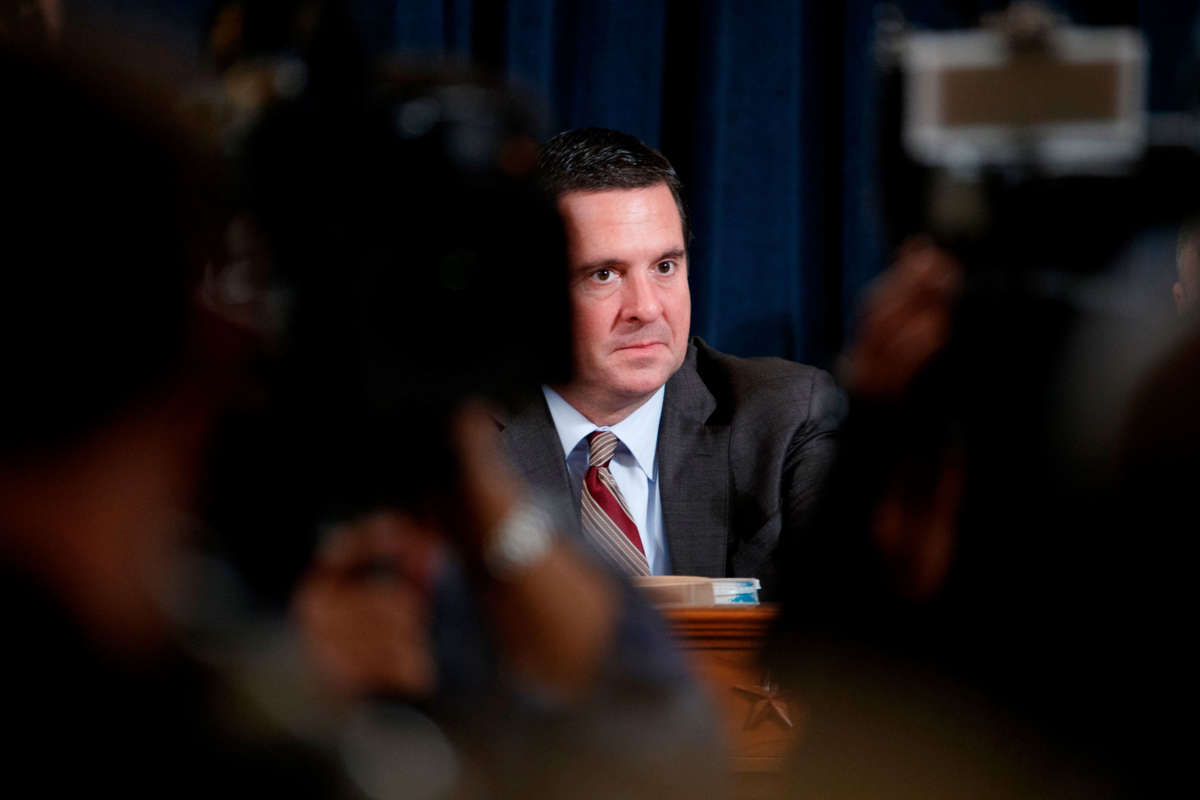Honest, paywall-free news is rare. Please support our boldly independent journalism with a donation of any size.
Last week, The Daily Beast reported that House Intelligence Committee Ranking Member Devin Nunes used $63,000 in taxpayer funds to travel to Europe where a central player in the impeachment drama, Lev Parnas, helped to arrange meetings for him. Parnas is the associate of President Trump’s personal attorney, Rudy Giuliani, who’s been indicted for illegal donations to the Trump campaign. Over the weekend, CNN reported that Nunes had gone to Europe to meet with a former Ukrainian prosecutor in order to secure dirt on Joe Biden, according to the lawyer for Parnas. Parnas’s lawyer also said that his client would be willing to testify before the House Intelligence Committee. CNBC built on the story, noting that Nunes wanted to take a different trip to meet with two other Ukrainian officials who claimed to have witnessed corruption by Democratic operatives. But when Nunes realized he’d have to notify House Intelligence Committee Chair Adam Schiff of his travels, he scrapped the trip, and had Parnas set up phone and Skype meetings instead. If the allegations are true, Nunes would be an active part of the very scandal whose investigation he is tasked with overseeing.
Nunes has not taken the news reports very well, declining to comment to CNN about the story by saying, “I don’t talk to you in this lifetime or the next lifetime.” He later voiced threats to sue CNN and The Daily Beast. Nunes is no stranger to retaliatory lawsuits; he responded to two parody Twitter accounts — “Devin Nunes’ Mom” and “Devin Nunes’ Cow” — with a lawsuit for defamation and “insulting words.” He’s also sued a California stone fruit grower who petitioned to have Nunes’s designation as a “farmer” removed from the 22nd district’s ballot, and sued Esquire magazine for writing about his dairy farm in Iowa.
Parnas’s claims should be met with scrutiny, and a public congressional hearing is not likely the proper initial forum for these claims to be aired. As national security writer Marcy Wheeler pointed out, taking public testimony from Parnas “risks inserting disinformation into a thoroughly credible story of corruption,” and a far better place for Parnas’s offered testimony would be before the House Ethics Committee.
It appears increasingly likely Nunes will face just such an ethics investigation. California Rep. Jackie Speier said, “If he was on a political errand for the president that was using taxpayer funds inappropriately, he should be investigated by the Ethics Committee and he should be forced to repay the Treasury the money that was spent.” House Armed Services Chair Adam Smith said that it was “quite likely, without question” that Nunes will face a House inquiry.
It wouldn’t be the first time that Nunes has faced an ethics investigation. In 2017, the House Ethics Committee reviewed whether Nunes mishandled classified information about the Intelligence Committee’s work by giving it to the White House. While the Committee ultimately cleared him, during the probe, Nunes stepped aside from a House Intelligence investigation into Russia’s involvement in the 2016 election.
Nunes was not stripped of his chairmanship in 2017, however, and that’s unlikely to happen now, either. The House Republican Caucus gets to determine the committee assignments, and they thus far seem unlikely to punish Nunes. The last time they punished a member of their party that stridently was when they stripped Rep. Steve King of his committee assignments after he questioned why the words “white supremacist” and “white nationalist” had become offensive. Democrats, however, could formally censure Nunes with a majority vote on a resolution disapproving his conduct. Nunes could also be expelled from Congress with a two-thirds vote in the House. (Only five members have ever been expelled from the House. The last one was Rep. James Traficant, Jr. in 2002, following his conviction for a conspiracy to violate federal bribery laws).
The House Republican response to impeachment proceedings thus far has been to toe the line, defend Trump and blame the Democrats. If Nunes was as central to the conspiracy as Parnas alleges, it would make that task harder. Nunes has been one of Trump’s most strident defenders in the House. That defense may soon be an even steeper uphill battle. Schiff has indicated an impeachment report will be prepared soon after Congress’s Thanksgiving recess. Meanwhile, public opinion continues to shift in favor of impeachment: Impeachment support stands at 48.2 percent as of November 25, according to FiveThirtyEight. This is up over 8 points since the Ukraine scandal snowballed on September 19, when only 40.1 percent supported impeachment and 51 percent opposed.
Nunes may have more in common with Trump than bombast and a penchant to sue anyone who angers him. With these new allegations, it appears that Nunes’s loyalty to Trump may be less about ensuring his political future in a party that still rates Trump highly, and more about some very real skin in the game. Nunes’s fate is very much tied to Trump. If the allegations are true and Nunes is caught up in Trump’s quest to cheat in an election by seeking dirt on Biden, Trump’s absolution among the public would also absolve him. But any shift against Trump could bring Nunes down right along with him.
Press freedom is under attack
As Trump cracks down on political speech, independent media is increasingly necessary.
Truthout produces reporting you won’t see in the mainstream: journalism from the frontlines of global conflict, interviews with grassroots movement leaders, high-quality legal analysis and more.
Our work is possible thanks to reader support. Help Truthout catalyze change and social justice — make a tax-deductible monthly or one-time donation today.
